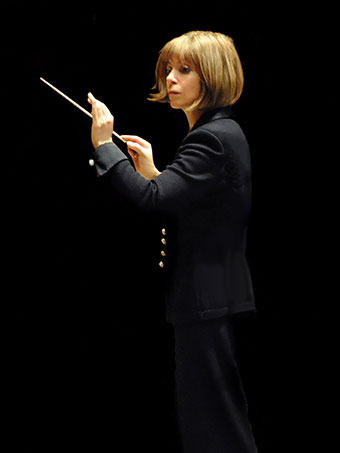Lost Symphony Rediscovered
by Jan Jezioro

The BPO offers the US premiere of work by Auschwitz victim
In her 10-year tenure as music director of the Buffalo Philharmonic Orchestra, JoAnn Falletta has done more than any other previous music director to raise both the national and even the international profile of the BPO through her very successful ongoing recording project with Naxos, as noted in a glowing lead article in the March issue of the prestigious British monthly music magazine Gramophone. Some of that recording success, which has resulted in two Grammy awards and several other Grammy nominations for the BPO, is due to Falletta’s willingness to take on challenging projects, both of contemporary music or of the forgotten music of the past, as in the case of the music of Marcel Tyberg.
On Saturday, April 30 at 8pm, and on Sunday, May 1, at 2:30pm, Falletta will lead the orchestra in the US premiere of Marcel Tyberg’s Symphony No. 2 in F minor. The story of the survival of the Austrian-born Tyberg’s manuscripts is a remarkable one. Tyberg (1893-1944) left Austria with his father, a prominent violinist and his mother, a noted pianist, in the middle of World War I, moving to Italy’s Adriatic region. Details of Tyberg’s own musical education are sketchy, but he emerged as a composer during the 1920s. After the death of his father, he eked out a meager living as an organist and teacher, supporting his mother while conducting some of his own works with local musical groups. Self-effacing to a fault, Tyberg never sought publication of his manuscripts. When the Germans occupied the region, Tyberg, who was murdered in Auschwitz, entrusted his manuscripts to a family friend, the Italian physician Milan Mihich. His son Enrico Mihich studied with Tyberg, and after his father died, he immigrated to the US with the manuscripts, working as a physician at Roswell Park. Mihich tried without any success to interest various Buffalo musicians in Tyberg’s work, until Falletta investigated the scores in 2005 and, recognizing their intrinsic musical worth, joined with the Foundation for Jewish Philanthropies in a project to perform and record all of Tyberg’s music.
In May 2008, the BPO and Falletta gave the world premiere of Marcel Tyberg’s Symphony No. 3 in D minor, subsequently recording the work for the Naxos label. That recording has garnered a slew of positive reviews in the international musical press.
Performing the music of Tyberg is a deeply emotional experience for Falletta. “I made a trip to Poland last winter,” Falletta says, “and it was very moving to visit Auschwitz, the place where Tyberg suffered and died. All that anyone can now do for Tyberg is to make sure that his memory stays alive through the performance of his music.”
Culture in Cinema: Aida
A recently added attraction to the popular Culture in Cinema live simulcast opera series is a performance of Verdi’s Aida from the Teatro del Maggio Musicale in Florence under the baton of the legendary Zubin Mehta, starring Marco Berti, Luciana D’Intino, and Hui He, on Tuesday, May 3 at 2:30pm. The Amherst Theatre (3500 Main Street across from UB South Campus) has been specially upgraded to accommodate the Culture in Cinema series. For more information, visit www.dipsontheatres.com.
While Tyberg’s Symphony No. 2 may have been performed by the Czech Philharmonic sometimes in the 1930s under the baton of Tyberg’s boyhood friend, the conductor Rafael Kubelik, then at the very beginning of his illustrious career, documentary evidence of the event has remained elusive. In any case, a performance tradition for the work does not exist, and that presents a certain challenge. “I’m very excited to be working on the second symphony,” says Falletta, “and a lot of decisions have to be made as to the interpretation of the score. It’s always an adventure to learn a new harmonic language, such as that of Tyberg. While he was not a cutting-edge composer, he did expand the artistic aesthetic of traditional 19th-century symphonic music, offering a fresh perspective on it without breaking the system apart. I hear the music of Schumann and Bruckner in the second symphony, while the last movement has a Bach-like, almost baroque quality.”
The program will also feature the return of soloist Christopher O’Riley in Grieg’s popular Concerto for Piano and Orchestra in A minor, Op. 16. Besides being a superb pianist, O’Riley has won the hearts of every lover of classical music in America through his role as the host of the long-running popular weekly classical radio series, From the Top, featuring the finest high-school age and younger—sometimes considerably younger—musicians in America. O’Riley has worked with the BPO in a couple of From the Top programs and no doubt the relationship will continue in the future. Falletta will also lead the BPO in a performance of Maurice Ravel’s exquisite tribute to his fallen World War I comrades, Le tombeau de Couperin.
For tickets and information, call 885-5000 or visit www.bpo.org.
blog comments powered by Disqus|
Issue Navigation> Issue Index > v10n17 (Best of Buffalo Issue, week of Thursday, April 28) > Lost Symphony Rediscovered This Week's Issue • Artvoice Daily • Artvoice TV • Events Calendar • Classifieds |









 Current Issue
Current Issue